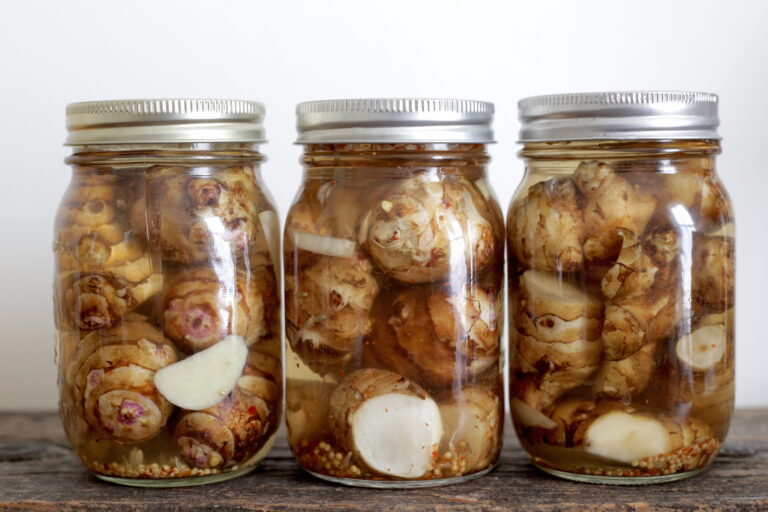
Camelia’s Lacto-Fermented Pickled Sunchokes
by Aube Giroux on Dec 6, 2018
These pickled sunchokes are simple to make and are a great addition to salads and tacos. Read more about Aube Giroux's time with Camelia on Kitchen Vignettes.
- Servings
- Makes about 3-4 pint jars
- Course
- Appetizer
Tags
Ingredients
- 2 pounds sunchokes (also known as Jerusalem artichokes)
- 1 quart of filtered water (chlorinated water will inhibit lacto-fermentation)
- 2 Tbsp sea salt or pickling salt (iodized table salt will inhibit lacto-fermentation)
- 4 cloves of garlic
- 1 tsp dried red pepper flakes or fresh chopped red pepper (optional, if you like it hot)
Instructions
-
Distribute the peeled garlic cloves and chopped red peppers or pepper flakes (optional) into the bottom of some pint mason jars (you’ll likely need 3 to 4). Wash and scrub the sunchokes well, but don’t worry about peeling them. If they are too large to fit inside your jars, feel free to cut them up into large chunks so they will fit. Because the cardinal rule of lacto-fermenting is to keep vegetables submerged UNDER the brine, a good method is to “jam” the sunchokes into the jar so they are held in place between the walls of the jar. This way they won’t bob up to the surface above the brine level. Another method of is to take a couple of popsicle sticks, cut them to the diameter of your jar, and work them inside the jar into a cross shape on top of the sunchokes, so they keep them down below the surface of the brine.
-
Mix the salt and water together until salt is dissolved. Once the jars are filled with sunchokes, garlic and pepper, pour enough water to submerge the contents, not going above the 1 inch mark from the top of the jar. Close up the jars, not too tight. Place them on a tray in case they bubble over, and let them sit in a dark space for about 5 to 7 days. After 2 days, you will start to see some bubbling. Check on the jars every day and “burp” them ever so slightly. In other words, loosen the twist top until you hear a little bit of air escape. (If the jars are left tightly sealed without burping them, a jar could burst). After a few days, you can taste them and when you’re happy with the taste and texture, put them in the fridge. This won’t entirely stop the fermentation process but will slow it down dramatically and your pickles will keep for several months.







